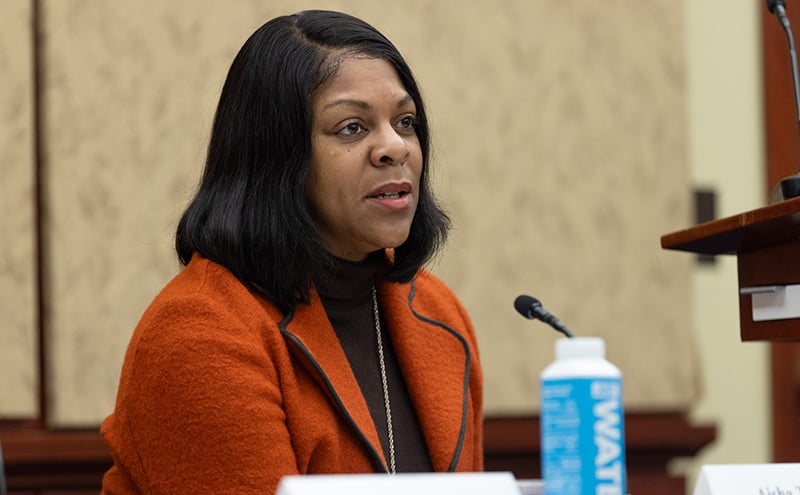ACEP and the American Hospital Association (AHA) co-hosted a Congressional briefing today to discuss violence in the emergency department and advocate for legislative solutions to protect health care workers.
ACEP President Aisha Terry, MD, FACEP, joined other health care leaders to detail the urgent need for accountability and stronger protections for health care professionals in front of a standing room only crowd at the U.S. Capitol Visitors Center in Washington, DC.
“We can’t be the safety net without feeling safe ourselves,” Dr. Terry said. “This is not a one-off. This is a daily situation in emergency departments across the country.”
Rep. Larry Bucshon, MD (R-IN) and Rep. Madeline Dean (D-PA) attended the briefing. Both Members of Congress are co-sponsors of the of the bipartisan SAVE Act, which ACEP helped develop and strongly supports.
“There’s currently no federal law that protects our health care workers. Simply put, the status quo is unacceptable,” said Rep. Bucshon.
Rep. Dean agreed: “The SAVE Act would make assaulting a health care worker a federal crime and gives grants for tailored solutions for protection,” she said. “Let’s step up and protect health care workers.”
Dr. Terry reminded the room that violence is not just a pandemic issue. Pervasive threats and attacks have an impact that extends beyond safety concerns alone.
She put the constant threats in the context of workforce challenges facing emergency medicine. “As we focus on safety, we also have to think about the future of our workforce,” said Dr. Terry. “If we are not there, who will be?”
Kate FitzPatrick, DNP, RN, NEA-BC, FAAN, Chief Nurse Executive Officer, Jefferson Health Philadelphia, explained that her nurse colleagues have characterized the problem as “chipping away at our souls.”
The panelists jointly called for accountability for willful threats or acts of violence and a change to the culture that seems to encourage workers to brush off these incidents as “just part of the job.”
“Nobody should expect to get beat up when they go to work,” said Mark Boucot, President and Chief Executive Officer, Garrett Regional Medical Center in Oakland, Maryland. “People tend to sweep these incidents under the rug and that creates a culture of acceptance – but it shouldn’t.”
Dr. Terry noted that effective ACEP state chapter advocacy has strengthened state laws, such as measures in Virginia requiring trained security onsite. Still, states can benefit from a federal push to protect health care workers and model legislation to follow.
While there’s no one-size-fits-all approach to protecting workers on the frontlines, ACEP does have a checklist to help emergency physicians speak to their hospital leaders about what a safe emergency department could look like.
“Emergency departments can be a barometer for society,” said Dr. Terry. “Increasingly crowded hospitals don’t help, and emergency care teams and patients are particularly vulnerable.”
This briefing is one of many ways that ACEP makes sure Congress hears from physicians who know the impact of violence firsthand. Your voice matters and continues to make a difference.
“Violence in emergency departments is a growing problem,” said Ryan McBride, MPP, ACEP Director of Congressional Affairs. “We are grateful for the leadership of Reps. Dean and Bucshon as we seek solutions to curb the attacks that emergency physicians experience on a daily basis.”
Interested in helping lawmakers find solutions to the issues that matter most to you and your patients? Attend this year’s ACEP Leadership & Advocacy Conference, April 14-16, where you can visit Capitol Hill and advocate in person for a better ED environment.



